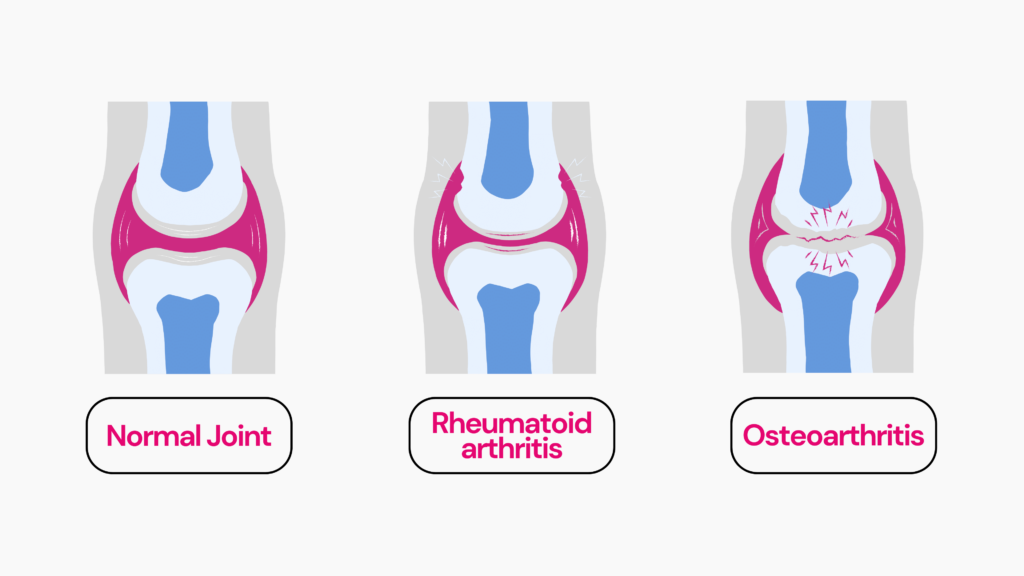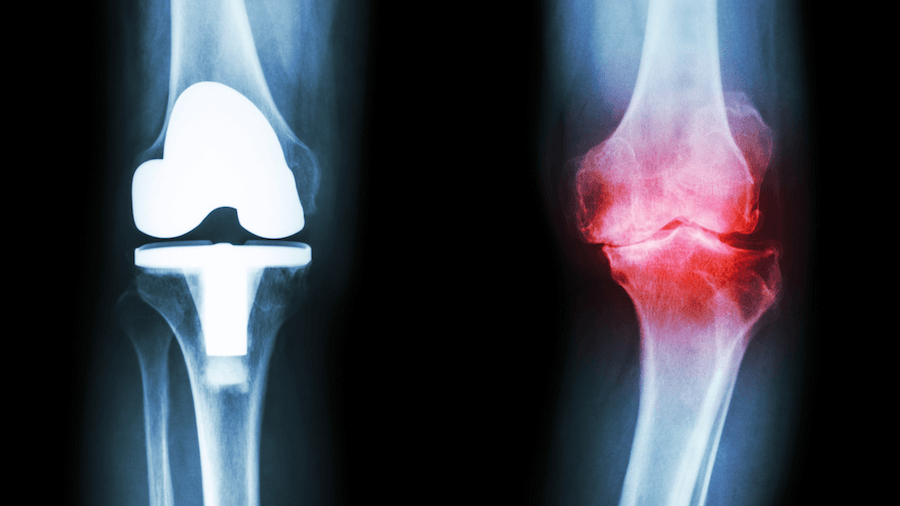Rheumatoid arthritis (RA) is a chronic autoimmune condition where the body’s immune system attacks the tissues in joint linings. While the exact cause of RA is unknown, researchers think it may be due to genetic, hormonal, environmental, and lifestyle-related factors. While there’s no cure for RA, the right treatments can relieve some symptoms. These symptoms differ across the 4 stages of rheumatoid arthritis. Learning about these stages can help you offer meaningful support to RA patients.
What Are The 4 Stages Of Rheumatoid Arthritis?
While most people associate RA with chronic joint pain and inflammation, it is actually a progressive autoimmune disease.
It progresses through four unique stages, namely:
- Stage 1: Early-stage RA
- Stage 2: Moderate-stage RA
- Stage 3: Severe RA
- Stage 4: End-stage RA
Stage 1: Early-stage Rheumatoid Arthritis
In the earliest stage of RA, people experience mild, localized symptoms.
What Happens: RA-related inflammation remains limited to the joint for now.
The tissues swell, often causing pain. While the bones are not damaged, the joint lining is inflamed.
Symptoms: Stiffness, pain, and joint swelling like the fingers and knuckles.
The symptoms are mild and hard to detect at this stage, and most people at this stage of RA are not aware of their condition.
Prompt management of RA at stage 1 includes a 12-week treatment, and most cases end with successful remission.
Stage 2: Moderate-stage Rheumatoid Arthritis
Since doctors often don’t diagnose RA at stage 1, it usually progresses to stage 2 or the moderate stage.
What Happens: Joint lining inflammation begins to damage the bone and cartilage around it.
Symptoms: While symptoms may not become apparent at this stage, some people may experience:
- Limited range of joint motion
- Stiffness and difficulty while bending the fingers.
Despite these symptoms, blood tests do not reveal RA antibodies yet, making it hard to diagnose at this stage.
Stage 3: Severe Rheumatoid Arthritis
At this stage, the disease is officially deemed severe.
What Happens: Bone damage at the joint continues and progresses to the cartilage.
With the joint cushion damaged, the bones rub together, causing pain and swelling.
Symptoms: Besides pain and swelling, other symptoms may become apparent, like:
- Muscle weakness
- Further loss of mobility
- Bone damage resulting in permanent twisting of fingers and thickening of knuckles
- Increased rupture risk of tendons on the fingers
Stage 4: End-Stage Rheumatoid Arthritis
At the final stage of RA, joint movement is almost entirely irregular.
Progression to stage 4 takes many years; not everyone experiences every stage.
What Happens: Bone, cartilage, and the entire joint unit are gradually destroyed.
Without any separation or cushion, the bones fuse, preventing any movement at the joint.
Symptoms: While there is no inflammation at the joint at this stage, people may still experience
- Pain
- Swelling
- Loss of mobility
What Is The Most Aggressive Form/Stage Of Rheumatoid Arthritis?
If your doctor suspects your symptoms indicate rheumatoid arthritis, they will recommend a Rheumatoid Factor (RF) test.
RFs are antibodies of different types and participate in forming immunoglobulin G (IgG).
People with RA have an elevated (>20 IU/ml) rheumatoid factor (RF) in their blood.
This elevation also helps diagnose diseases like tuberculosis and Sjogren’s syndrome.
Based on the presence of this RF and antibodies called anti-cyclic citrullinated peptides (anti-CCPs), rheumatoid arthritis can be of two types:
- Seropositive: Blood tests show high levels of anti-CCPs and RF. It is a more common and aggressive form of RA.
- Seronegative: Blood tests do not detect anti-CCPs and RF
Seropositive individuals may also have manifestations like rheumatic nodules and vasculitis outside the joint.
Rheumatoid Arthritis Progression
Though RA is a progressive disease, each patient’s journey could differ.
What Are The Signs Of Rheumatoid Arthritis Progressing From Stages 1 To 4?
People with stages 1 and 2 of rheumatoid arthritis usually do not experience any symptoms.
As the disease progresses to stages 3 and 4, they may experience the following:
- Increased pain and swelling in the joints
- Increased joint stiffness and reduced mobility
- Gradual loss of function of their hands
- Difficulty in bending knees or flexing their hips
Factors Affecting Rheumatoid Arthritis Progression
How your rheumatoid arthritis progresses depends upon many factors:
- Family history of the condition
- Age at the time of diagnosis
- Stage of rheumatoid arthritis at the time of diagnosis
- Disease trigger factors
- Elevated RF or anti-CCPs in the blood
- Lifestyle habits like smoking
Understanding how your disease is likely to progress also helps your doctor determine the most effective treatment plan for you.
Preventing Rheumatoid Arthritis Progression
An RA diagnosis isn’t necessarily the end of the world.
Some tips to prevent the progression of the disease include:
- Spot flare-ups and report them to your doctor immediately. They can help you identify trigger factors and reduce flare-ups over time.
- Medicate responsibly as per your doctor’s advice. Do not stop or change medications for better results without asking your doctor.
- Consume anti-inflammatory foods like berries, fish, leafy greens, and olive oil.
- Avoid inflammatory foods that often contain processed sugar, alcohol, and red meat.
- Regular exercise helps decrease inflammation, improve mobility, keep joints flexible, reduce pain, and stay mentally upbeat.
- Quit smoking; it could potentially speed up RA progression.
Treating Rheumatoid Arthritis
Treating rheumatoid arthritis is primarily aimed at optimum symptom management and sending the disease into remission.
Common treatment modalities used for rheumatoid arthritis include:
- Medications
- NSAIDs and steroids: To reduce inflammation
- Disease-modifying antirheumatic drugs: To protect joint tissue and suppress immune response
- Biologic drugs: To modify the body’s inflammatory response
- Surgery: May be required in the advanced stages of rheumatoid arthritis.
FAQs About Rheumatoid Arthritis
What Should You Not Do If You Have Rheumatoid Arthritis?
Remaining sedentary, being irresponsible with your medications, and staying down in the dumps for extended periods can worsen rheumatoid arthritis significantly.
How Do You Calm A Rheumatoid Arthritis Flare-Up?
Cool packs, gentle exercises, hot baths, and pain medication can all help combat a sudden, painful rheumatoid arthritis flare-up.
Which Drink Is Good For Rheumatoid Arthritis?
Orange, tomato, pineapple, and carrot juices contain many antioxidants that help combat inflammation from rheumatoid arthritis flare-ups.
Summary: The Stages Of Rheumatoid Arthritis
- Rheumatoid arthritis (RA) is a chronic, autoimmune systemic condition in which the body’s immune system attacks the tissues lining the healthy joints.
- Rheumatoid arthritis is a progressive condition that goes through four stages.
- The four stages of rheumatoid arthritis are early, moderate, severe, and late-stage RA.
- As RA progresses to stage 4, bone, cartilage, and the entire joint unit are gradually destroyed.
- Rheumatoid arthritis can be diagnosed as seropositive or seronegative based on the presence and levels of rheumatic factors and anti-cyclic citrullinated peptides in the blood.
- You could slow its progression considerably with timely intervention, medication, exercise, and the right diet.
- Treatment options for RA include medications (NSAIDs, DMARDs, biologics) and surgery.
Others Are Also Reading

Is Arthritis Genetic?

Is Osteoarthritis Genetic?

The 7 Stages Of Lewy Body Dementia, Explained
References
- https://www.medicalnewstoday.com/articles/stages-of-rheumatoid-arthritis
- https://www.healthline.com/health/rheumatoid-arthritis/stages-and-progression
- https://creakyjoints.org/about-arthritis/rheumatoid-arthritis/ra-overview/rheumatoid-arthritis-stages-progression/
- https://arthritiscare.com.au/the-4-stages-of-rheumatoid-arthritis/
- https://www.goodrx.com/conditions/rheumatoid-arthritis/rheumatoid-arthritis-stages
- https://my.clevelandclinic.org/health/diseases/4924-rheumatoid-arthritis
- https://www.webmd.com/rheumatoid-arthritis/ra-progression





